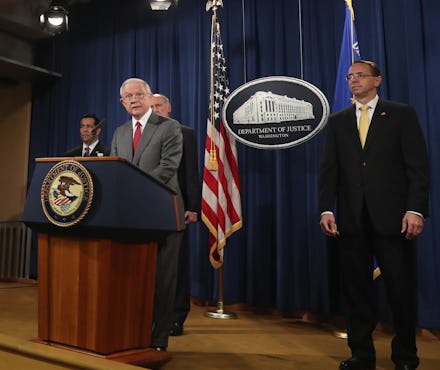Sessions, threatening leakers, says DOJ is reviewing policy on media subpoenas

The Department of Justice is reviewing its policies affecting government prosecutors’ ability to subpoena journalists as part of an effort to crack down on leaks that have become commonplace during the Trump administration, U.S. Attorney General Jeff Sessions said Friday.
At a press conference, Sessions, flanked by Director of National Intelligence Dan Coats and Deputy Attorney General Rod Rosenstein, condemned the “staggering number” of government leaks and threatened government leakers with prosecution. “Don’t do it,” Sessions warned.
The comments come a few days after President Donald Trump, who has expressed anger at the steady stream of leaks involving his administration, said that Sessions was “weak” on government leakers. Trump has also expressed his unhappiness with Sessions for the attorney general’s decision to recuse himself from the ongoing investigations into the Trump campaign’s alleged ties to Russia.
On Friday, Sessions said that the Justice Department had tripled the number of active leak investigations, and said that the FBI had created a new counterintelligence unit dedicated to cracking down on leaks. Sessions did not provide details as to what policy changes the department was considering.
“One of the things we are doing is reviewing our policies affecting media subpoenas,” Sessions said. “We respect the important role that the press plays, and we’ll give them respect, but it is not unlimited. They cannot place lives at risk with impunity. We must balance the press’s role with protecting our national security and the lives of those who serve in the intelligence community, the armed forces, and all law-abiding Americans.”
Sessions cited the Washington Post’s publication of transcripts of conversations between Trump and two world leaders as the latest example of a government leak that he and Rosenstein said was damaging to national security.
“We will not allow rogue anonymous sources with security clearances to sell out our country,” Sessions said.
Coats, who spoke after Sessions, said that government whistleblowers should go through official government channels to report their concerns instead of leaking information to the media, and he reiterated Sessions’ threat of prosecution to leakers.
“We will find you, we will investigate you, and we will prosecute you to the full extent of the law, and you will not be happy with the results,” Coats said.
Sessions, Coats and Rosenstein left the press conference abruptly without answering questions about whether they would seek to prosecute journalists.